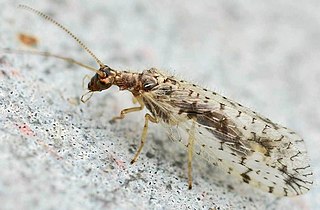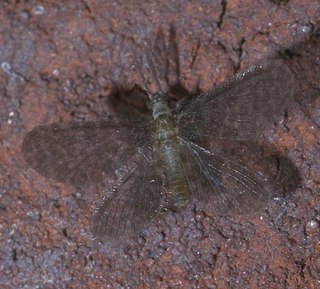
Hemerobiidae is a family of Neuropteran insects commonly known as brown lacewings, comprising about 500 species in 28 genera. Most are yellow to dark brown, but some species are green. They are small; most have forewings 4–10 mm long. These insects differ from the somewhat similar Chrysopidae not only by the usual coloring but also by the wing venation: hemerobiids differ from chrysopids in having numerous long veins and forked costal cross veins. Some genera are widespread, but most are restricted to a single biogeographical realm. Some species have reduced wings to the degree that they are flightless. Imagines (adults) of subfamily Drepanepteryginae mimic dead leaves. Hemerobiid larvae are usually less hairy than chrysopid larvae.

Dilaridae is a family of insects in the order Neuroptera, known as "pleasing lacewings". They were formerly placed in the superfamily Hemerobioidea. But it seems that the Dilaridae are a rather basal member of the Mantispoidea, which includes among others the mantidflies (Mantispidae), whose peculiar apomorphies belie that their relationship to the pleasing lacewings is apparently not at all distant.

Meloe americanus, the buttercup oil beetle, is a species of blister beetle in the family Meloidae. It is found in North America.

Nallachius is a genus of pleasing lacewings in the family Dilaridae. There are more than 20 described species in Nallachius.
Ululodes quadripunctatus, the four-spotted owlfly, is a species of owlfly in the family Ascalaphidae. It is found in Central America and North America.

Leptomantispa pulchella is a species of mantidfly in the family Mantispidae. It is found in the Caribbean Sea, Central America, and North America.

Leptomantispa is a genus of mantidflies in the family Mantispidae. There are about seven described species in Leptomantispa.

Myrmeleon immaculatus is a species of pit-trapping antlion in the family Myrmeleontidae. It is found in Central America and North America and is a particularly common species in the eastern United States.
Ascaloptynx is a genus of owlflies in the family Ascalaphidae. There are at least two described species in Ascaloptynx.

Zeugomantispa minuta, the green mantisfly, is a species of mantidfly in the family Mantispidae. It is found in the Caribbean Sea, Central America, North America, and South America.

Zeugomantispa is a genus of mantidflies in the family Mantispidae. There are at least three described species in Zeugomantispa.
Dendroleon speciosus is a species of antlion in the family Myrmeleontidae. It is found in North America.

Leucochrysa is a genus of green lacewings in the family Chrysopidae. There are more than 180 described species in Leucochrysa.
Megalomus fidelis is a species of brown lacewing in the family Hemerobiidae. It is found in Central America and North America.
Xeromantispa is a genus of mantidflies in the family Mantispidae. There is one described species in Xeromantispa, X. scabrosa.

Dicromantispa interrupta is a species of mantidfly in the family Mantispidae. It is found in Central America and North America.

Dicromantispa is a genus of mantidflies in the family Mantispidae. There are about 10 described species in Dicromantispa.
Sisyra apicalis is a species of spongillafly in the family Sisyridae. It is found in the Caribbean Sea, Central America, North America, and South America.
Megalomus carpenteri is a species of brown lacewing in the family Hemerobiidae. It is found in North America. The specific epithet carpenteri honors paleoentomologist Frank M. Carpenter for his taxonomic work on the Neuroptera.
Nallachius pulchellus is a species of pleasing lacewing in the family Dilaridae. It is found in the Caribbean Sea, Central America, and North America.









